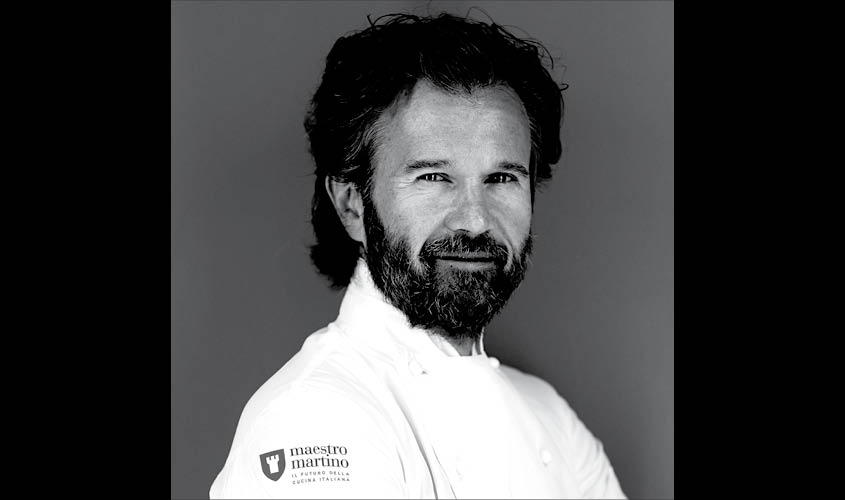Q. You started your career as a chef in Milan. Tell us about your professional journey.
A. I was born in Vicenza and attended the Professional Hotel Institute near the city in north Italy. The institute is a part of European Association of Hotel and Tourism School. While attending the institute, I also worked for the restaurant Da Remo, where I had the chance to learn traditional preparations.
In 1986, I began my professional career at Gualtiero Marchesi, in Milan, which is the first Italian restaurant to be awarded three Michelin stars. Then I was appointed at La Meridiana, in Garlenda (Savona), part of the famous Relais & Chateaux chain.
For the next three years, I resided in France, where I learned about French cuisine under the guidance of Alain Ducasse (Hotel de Paris) and Lucas Carton (Senderens, Paris). I finally returned to Italy where I worked at Enoteca Pinchiorri in Florence. During the tenure, the restaurant was awarded three Michelin stars.
Chef Gualtiero Marchesi called me back for the opening of his restaurant L’Albereta, in Erbusco, Brescia, where I worked for the next three years. Soon afterward I opened Le Clivie in Piobesid’Alba, Cuneo, which earned the Michelin star after one year.
In 2001, I accepted an invitation from the Stoppani family, owner of Milan’s famous gourmet shop Peck, in Milan since 1883, to open Cracco-Peck Restaurant. Since then, it has been bestowed with two Michelin stars. Since 1 July 2007, my restaurant Ristorante Cracco was listed among the World’s best 50 restaurants. I was one of the three judges of the TV series Masterchef Italy (food reality show) for six years. In 2012, the Trussardi family asked me to manage their fine dining restaurant Trussardi Alla Scala in Milano.
The same year I began collaboration with Singapore Airline, curating the menu for the first and business class. In 2013, I collaborated with Trenitalia for the menu of the executive class on the train.
Today, I am the president of the no-profit association Maestro Martino, whose aim is to contribute to the cultural promotion of Author’s Cuisine, particularly the Lombard one and its excellent territory food products.
I opened Carlo e Camilla in Segheria, Milan in 2014—a gastro-bistrot with a unique style. The location is an old sawmill. It has been listed as the best restaurant for interior design for Wallpaper 2015. I also judged a TV show Hell’s Kitchen Italia in 2014. I was also nominated by Regione Lombardia Ambassador for EXPO 2015.
In 2016, I opened my first restaurant outside Italy with a new brand OVO by Carlo Cracco in Moscow inside the Lotte Hotel. I opened Garage Italia Milano in collaboration with Lapo Elkann, a bistrot (pub) and cocktail bar inside an old gas station by Enrico Mattei in 2017.
Recently in February 2018, I launched my project inside Galleria Vittorio Emanuele II in Milano that includes the new Ristorante Cracco, wine cellar, cafè-bistrot and a private space for events.
Q. You are known for your fusion of Italian food. Where do you find inspiration to experiment with various dishes?
A. I love to take inspirations from different tastes, cultures, and people. When I travel, I try to discover the most from other people.
Q. You wrote a book on Italian regional recipes. Which one of these recipes is your favourite?
A. It is hard to tell one. Italy is amazing because of its diversity. There are so many different ingredients and traditions in regional cuisines.
Q. What excites you about cooking?
A. I love to express my thoughts and my ideas through the dishes I prepare.
Q. Wastage of food is a huge problem all over the world. Do you have any advice for chefs and hoteliers in regard to food waste management?
A. A good chef does not waste anything. I always teach my chefs to learn not to waste anything and to re-use all the parts that we might not need for our recipe.
Q. Can food be a means to learn about other cultures?
A. It is a great way to discover cultures, people and territory. Food can be a great trip-compass.
Q. You participated as a judge in a recent Italian reality show on cooking. How was that experience? Are such shows helpful for budding chefs?
A. It was a good experience. I met a lot of interesting people and had a great experience. Perception of food has been changing and growing a lot, and I’m happy about it.

